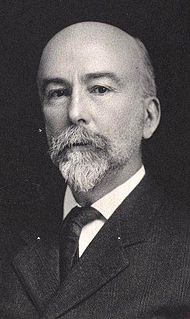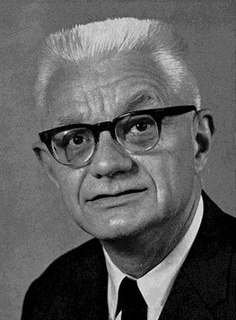A Quote by Herbert Spencer
Organs, faculties, powers, capacities, or whatever else we call them; grow by use and diminish from disuse, it is inferred that they will continue to do so. And if this inference is unquestionable, then is the one above deduced from it-that humanity must in the end become completely adapted to its conditions-unquestionable also. Progress, therefore, is not an accident, but a necessity.
Related Quotes
It is an unquestionable truth, that the body of the people in every country desire sincerely its prosperity. But it is equally unquestionable that they do not possess the discernment and stability necessary for systematic government. To deny that they are frequently led into the grossest of errors, by misinformation and passion, would be a flattery which their own good sense must despise.
This is my long-run forecast in brief: The material conditions of life will continue to get better for most people, in most countries, most of the time, indefinitely. Within a century or two, all nations and most of humanity will be at or above today's Western living standards. I also speculate, however, that many people will continue to think and say that the conditions of life are getting worse.
The very foundation of our science is only an inference; far the whole of it rests an the unprovable assumption that, all through the inferred lapse of time which the inferred performance of inferred geological processes involves, they have been going on in a manner consistent with the laws of nature as we know them now.
We are apt to consider that invention is the result of spontaneous action of some heavenborn genius, whose advent we must patiently wait for, but cannot artificially produce. It is unquestionable, however, that education, legal enactments, and general social conditions have a stupendous influence on the development of the originative faculty present in a nation and determine whether it shall be a fountain of new ideas or become simply a purchaser from others of ready-made inventions.
The propositions of mathematics have, therefore, the same unquestionable certainty which is typical of such propositions as "All bachelors are unmarried," but they also share the complete lack of empirical content which is associated with that certainty: The propositions of mathematics are devoid of all factual content; they convey no information whatever on any empirical subject matter.
Why continue? Because we must. Because we have the call. Because it is nobler to fight for rationality without winning than to give up in the face of continued defeats. Because whatever true progress humanity makes is through the rationality of the occasional individual and because any one individual we may win for the cause may do more for humanity than a hundred thousand who hug their superstitions to their breast.
Nationality is not a universal human principle but an historical, local fact...Every nation, even a small one, has its own character, its own particular way of life and manner of speaking, feeling, thinking, and behaving. These distinctive features are the essence of nationality, the product of a nation's entire history and conditions of existence. Every nation, like every individual, is of necessity what it is, and has an unquestionable right to be itself. So-called national rights consist precisely of this.
A nation that will keep people in slavery for 244 years will "thingify" them and make them things. And therefore, they will exploit them and poor people generally economically. And a nation that will exploit economically will have to have foreign investments and everything else, and it will have to use its military might to protect them. All of these problems are tied together. What I'm saying today is that we must go from this convention and say, "America, you must be born again!"
Humans, like all other creatures, must make a difference; otherwise, they cannot live. But unlike other creatures, humans must make a choice as to the kind and scale of difference they make. If they choose to make too small a difference, they diminish their humanity. If they choose to make too great a difference, they diminish nature, and narrow their subsequent choices; ultimately, they diminish or destroy themselves. Nature, then, is not only our source but also our limit and measure.
People with intelligence must use their intelligence, people with eyes must use their eyes, people with the capacity to love have the impulse to love and the need to love in order to feel healthy. Capacities clamor to be used, and cease their clamor only when they are used sufficiently. That is to say, capacities are needs, and therefore are intrinsic values as well.







































